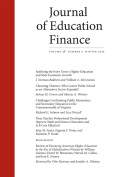
Journal of Education Finance
Scope & Guideline
Illuminating Financial Strategies for Education
Introduction
Aims and Scopes
- Educational Equity and Funding Models:
The journal emphasizes research on equitable funding models for K-12 and higher education systems, exploring how resources are allocated in relation to student needs, particularly in underserved communities. - Impact of Economic Factors on Education:
It investigates the effects of economic fluctuations, such as recessions or changes in funding policies, on educational outcomes and institutional financial health. - Special Education Funding:
The journal addresses the complexities surrounding funding for special education, including the adequacy and equity of resources allocated to support diverse learners. - Higher Education Financial Policies:
Research in this area examines the policies surrounding funding for higher education institutions, including the implications of financial aid programs and state appropriations. - Budgeting and Expenditure Analysis:
The journal provides insights into how educational institutions manage and allocate their budgets, often through empirical studies that analyze spending choices and their impacts on educational outcomes.
Trending and Emerging
- Impact of Federal and State Funding on Equity:
There has been an increased focus on how federal and state funding policies influence equity in education, particularly in the context of recovery funding post-COVID-19. - Student Loan Debt and Economic Implications:
Research addressing the implications of student loan debt on individuals and the economy has gained importance, reflecting growing concerns over the sustainability of student financing. - Effects of Economic Recessions on Education Financing:
Emerging studies are increasingly examining the lasting impacts of economic downturns on educational institutions' financial health and student outcomes. - Technological Integration and Funding:
The journal has started to feature more analyses on how technology funding affects educational access and quality, particularly in light of the recent shift to online learning. - Comprehensive Approaches to Special Education Funding:
There is a trend towards exploring comprehensive and equitable approaches to funding special education, emphasizing the need for targeted investments that address specific needs.
Declining or Waning
- Traditional Models of Education Finance:
Research focusing solely on traditional funding models without consideration of equity or outcomes has become less frequent, as there is a growing recognition of the need for innovative and equitable solutions. - Generalized Studies of Educational Outcomes:
There has been a shift away from broad, generalized studies of educational outcomes without specific financial implications, as more nuanced analyses of funding impacts on diverse populations gain traction. - State-Specific Analyses Without Broader Context:
While state-specific analyses are still present, there is a noticeable decline in studies that lack a broader contextual understanding of national trends in educational finance.
Similar Journals
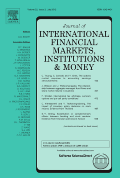
Journal of International Financial Markets Institutions & Money
Innovating Research in International FinanceThe Journal of International Financial Markets, Institutions & Money, published by Elsevier, serves as a leading platform for the dissemination of high-quality research in the fields of finance, economics, and econometrics. With an impressive impact factor reflected in its status as a Q1 journal in both categories for 2023, it ranks among the top journals, positioned at #47 out of 317 in Finance and #111 out of 716 in Economics. This journal offers a unique focus on the interplay between financial markets and institutions on a global scale, making it an essential resource for scholars, practitioners, and students alike. The journal welcomes innovative theoretical, empirical, and applied research, contributing to an exciting dialogue that shapes the future of international finance. For researchers looking to publish their findings, this journal is committed to rigorously engaging with contemporary financial phenomena, positioning itself as a vital cornerstone of academic and professional discourse.
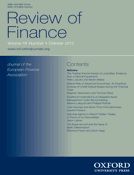
Review of Finance
Exploring the intersections of finance, accounting, and economics.The Review of Finance, published by Oxford University Press, stands as a premier academic journal in the fields of Finance, Accounting, and Economics. With an ISSN of 1572-3097 and an impressive track record stretching from 2001 to 2024, this journal is consistently recognized for its high-quality research, reflected in its Q1 rankings across key categories, including Accounting, Finance, and Economics and Econometrics. The Review of Finance is dedicated to advancing the understanding of financial phenomena through robust empirical and theoretical insights, making it an essential resource for researchers and professionals alike. Additionally, its strong Scopus rankings, placing it in the top percentiles, highlight its influence and relevance in ongoing academic discourse. Although the journal is not open access, it remains widely accessible through academic institutions, ensuring that its valuable contributions reach an extensive audience. The editorial board invites submissions that promise to further engage the academic community in the dynamic intersections of finance, accounting, and economic research.
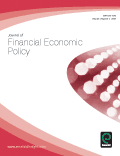
Journal of Financial Economic Policy
Bridging theory and practice in financial economic research.Journal of Financial Economic Policy is a premier academic journal published by EMERALD GROUP PUBLISHING LTD, focusing on the intersection of finance and economics. Through rigorous peer-reviewed research, the journal aims to advance understanding of financial policies and economic frameworks, addressing critical issues faced by financial markets and institutions. With an ISSN of 1757-6385 and an E-ISSN of 1757-6393, it serves as a reputable source of information for researchers, professionals, and students alike. The journal operates within the United Kingdom and is recognized for its contributions to the fields of economics and finance, achieving a Q3 category ranking in both disciplines as per the 2023 metrics. This places it within the top half of journals in its category according to Scopus ranks, demonstrating a solid impact in the academic community. Although it is not an open-access journal, the insights and analyses published are invaluable for those seeking to grasp complex financial phenomena and develop effective policies. The journal’s scope encompasses a wide range of topics relevant to contemporary finance and economic strategies, making it an essential resource for ongoing scholarly discourse and practical applications.
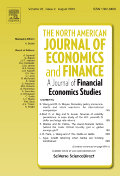
North American Journal of Economics and Finance
Elevating scholarship in economic and financial research.The North American Journal of Economics and Finance is a premier academic journal published by Elsevier Science Inc. since 1992, dedicated to advancing the field of economics and finance through rigorous research and scholarship. With an impressive impact factor and recognition in the Q2 category for Economics and Econometrics and Q1 for Finance as of 2023, this journal holds a significant position in the academic community, ranked #41 out of 317 in Finance and #100 out of 716 in Economics. The journal features high-quality, peer-reviewed articles that cover a broad range of topics, from theoretical frameworks to empirical analyses and practical applications. Though not an open-access platform, the journal provides valuable insights for researchers, practitioners, and students alike, promoting knowledge dissemination in the dynamic landscape of economic and financial studies. With its commitment to excellence, the North American Journal of Economics and Finance serves as an essential resource for those seeking to deepen their understanding of contemporary issues in these critical fields.
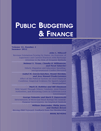
Public Budgeting and Finance
Navigating the Complexities of Public FinancePublic Budgeting and Finance is a distinguished journal published by WILEY, encompassing pivotal research in the fields of public administration, economics, and finance. With an impressive track record of publications dating back to 1981, this journal plays a crucial role in informing and shaping public policy and fiscal management practices. It operates without open access, ensuring a selective and highly curated set of research that maintains rigorous academic standards. The journal consistently ranks in the second quartile (Q2) across its categories, highlighting its relevance and influence within the academic community. With Scopus rankings placing it in the 45th percentile for Public Administration and Finance, it serves as an essential resource for researchers, practitioners, and students aiming to enhance their understanding of budgeting processes and fiscal governance in both theory and practice. The journal is a go-to source for innovative approaches and evidence-based practices that address contemporary challenges in public finance, making it indispensable for anyone seeking to contribute meaningfully to this vital field.
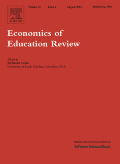
ECONOMICS OF EDUCATION REVIEW
Bridging the gap between education and economic policy.Economics of Education Review, published by Pergamon-Elsevier Science Ltd, is a premier journal dedicated to the intersection of educational policy and economic theory. Established in 1981, this esteemed journal has continually provided a platform for high-quality research focused on how education systems can be improved through economic analysis. With an impressive impact factor and categorized in the Q1 quartile for both Economics and Education in 2023, it ranks among the top journals in its field, boasting a Scopus rank of #480/1543 in Social Sciences - Education, highlighting its significant influence and reach. The journal is not open access, ensuring a curated selection of scholarly articles and rigorous peer review that upholds the highest academic standards. Its scope encompasses a diverse range of topics including educational finance, labor market outcomes of educational policies, and the economics of educational institutions, making it essential reading for researchers, policymakers, and practitioners committed to advancing educational quality and accessibility.
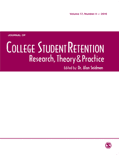
Journal of College Student Retention-Research Theory & Practice
Advancing Student Success Through Research and PracticeThe Journal of College Student Retention: Research Theory & Practice, published by SAGE Publications Inc, serves as a pivotal platform for scholars and practitioners in the field of education, particularly focusing on the multifaceted dynamics of student retention in higher education. With an ISSN of 1521-0251 and an E-ISSN of 1541-4167, this peer-reviewed journal, categorized in the Q2 quartile for Education, has established its significance within academic circles, evidenced by its impressive Scopus ranking of 286 out of 1543 in the Social Sciences/Education category, placing it in the top 19th percentile. The journal aims to advance research, theory, and practice addressing student retention challenges, making it a vital resource for educators, administrators, and researchers committed to enhancing student success in colleges and universities. Although not Open Access, the journal's commitment to high-quality scholarship promises that every published article contributes meaningfully to the discourse on effective retention strategies, policy interventions, and innovative practices within the educational landscape.
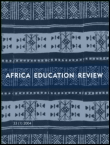
Africa Education Review
Shaping the Future of Education in AfricaAfrica Education Review is a pivotal academic journal dedicated to advancing the field of education across the African continent and beyond. Published by Routledge Journals, Taylor & Francis Ltd in the United Kingdom, this journal serves as a platform for original research and critical discourse that addresses educational policies, practices, and innovations relevant to Africa. With an impactful and insightful scope, the journal has earned a rank of #953 out of 1543 in the category of Social Sciences - Education, placing it in the 38th percentile among its peers and categorized in Q3 for the year 2023. Over the converged years from 2015 to 2024, Africa Education Review aims to provide inclusive access to knowledge, enhancing educational outcomes and contributing to sustainable development through scholarly engagement. Though lacking open access options, the journal remains an essential resource for researchers, educators, and students seeking to gain critical insights and share impactful studies in African education.
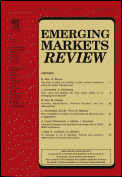
Emerging Markets Review
Shaping Insights for Tomorrow's EconomiesEmerging Markets Review, published by Elsevier, stands as a leading platform for scholarly discourse in the fields of Business, International Management, and Economics. With a strong focus on the dynamic and evolving landscapes of emerging markets, this journal boasts an impressive impact factor, reflecting its high-quality research and significant contribution to the academic community. Covering a wide array of topics pertinent to emerging economies, the journal is dedicated to disseminating cutting-edge research findings, theoretical advancements, and practical insights that are essential for both researchers and industry professionals. Operating since 2000, and with its converged years extending to 2024, Emerging Markets Review has secured a Q1 category ranking in both its primary domains (Business and International Management; Economics and Econometrics), underscoring its critical role in shaping knowledge and practices in these fields. The journal's esteemed reputation is further highlighted by its strong Scopus rankings, placing it among the top percentile for relevant subject areas. Although it is not an Open Access journal, it remains accessible through institutional subscriptions, ensuring that the wealth of knowledge contained within its pages reaches a broad audience.
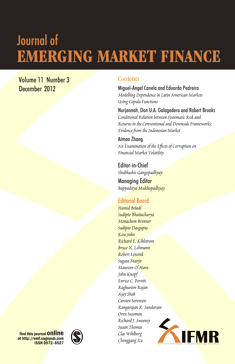
Journal of Emerging Market Finance
Transforming Perspectives on Emerging Market FinanceThe Journal of Emerging Market Finance, published by SAGE Publications India Pvt Ltd, is a premier academic journal that serves as a vital resource for researchers, professionals, and students in the fields of finance and economics. Established in 2002, this journal focuses on the multifaceted dynamics of emerging market economies and their financial systems. With an ISSN of 0972-6527 and an E-ISSN of 0973-0710, it has garnered attention with its respectable Q3 rankings in both the Economics and Econometrics and Finance categories, reflecting its commitment to high-quality research. Despite its limited open-access options, the journal remains a significant platform for scholarly discussions, providing insights on emerging financial instruments, market behaviors, and economic policies in developing economies. As a continuously evolving publication, it aims to bridge the gap between theory and practice, promoting an understanding of the complexities faced in these vibrant markets, ultimately serving the academic community with relevant and impactful research until 2024 and beyond.